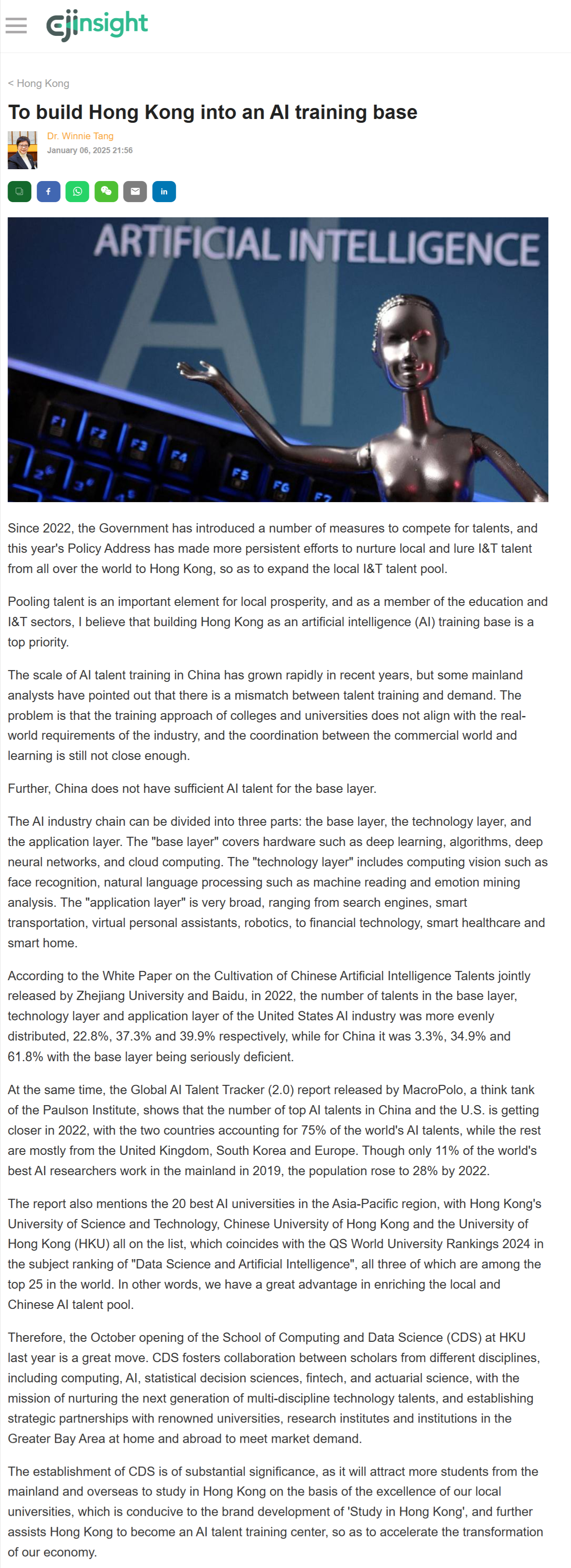網上版請按此

To build Hong Kong into an AI training base
Since 2022, the Government has introduced a number of measures to compete for talents, and this year's Policy Address has made more persistent efforts to nurture local and lure I&T talent from all over the world to Hong Kong, so as to expand the local I&T talent pool.
Pooling talent is an important element for local prosperity, and as a member of the education and I&T sectors, I believe that building Hong Kong as an artificial intelligence (AI) training base is a top priority.
The scale of AI talent training in China has grown rapidly in recent years, but some mainland analysts have pointed out that there is a mismatch between talent training and demand. The problem is that the training approach of colleges and universities does not align with the real-world requirements of the industry, and the coordination between the commercial world and learning is still not close enough.
Further, China does not have sufficient AI talent for the base layer.
The AI industry chain can be divided into three parts: the base layer, the technology layer, and the application layer. The "base layer" covers hardware such as deep learning, algorithms, deep neural networks, and cloud computing. The "technology layer" includes computing vision such as face recognition, natural language processing such as machine reading and emotion mining analysis. The "application layer" is very broad, ranging from search engines, smart transportation, virtual personal assistants, robotics, to financial technology, smart healthcare and smart home.
According to the White Paper on the Cultivation of Chinese Artificial Intelligence Talents jointly released by Zhejiang University and Baidu, in 2022, the number of talents in the base layer, technology layer and application layer of the United States AI industry was more evenly distributed, 22.8%, 37.3% and 39.9% respectively, while for China it was 3.3%, 34.9% and 61.8% with the base layer being seriously deficient.
At the same time, the Global AI Talent Tracker (2.0) report released by MacroPolo, a think tank of the Paulson Institute, shows that the number of top AI talents in China and the U.S. is getting closer in 2022, with the two countries accounting for 75% of the world's AI talents, while the rest are mostly from the United Kingdom, South Korea and Europe. Though only 11% of the world's best AI researchers work in the mainland in 2019, the population rose to 28% by 2022.
The report also mentions the 20 best AI universities in the Asia-Pacific region, with Hong Kong's University of Science and Technology, Chinese University of Hong Kong and the University of Hong Kong (HKU) all on the list, which coincides with the QS World University Rankings 2024 in the subject ranking of "Data Science and Artificial Intelligence", all three of which are among the top 25 in the world. In other words, we have a great advantage in enriching the local and Chinese AI talent pool.
Therefore, the October opening of the School of Computing and Data Science (CDS) at HKU last year is a great move. CDS fosters collaboration between scholars from different disciplines, including computing, AI, statistical decision sciences, fintech, and actuarial science, with the mission of nurturing the next generation of multi-discipline technology talents, and establishing strategic partnerships with renowned universities, research institutes and institutions in the Greater Bay Area at home and abroad to meet market demand.
The establishment of CDS is of substantial significance, as it will attract more students from the mainland and overseas to study in Hong Kong on the basis of the excellence of our local universities, which is conducive to the brand development of 'Study in Hong Kong', and further assists Hong Kong to become an AI talent training center, so as to accelerate the transformation of our economy.
Dr Winnie Tang
Adjunct Professor, School of Computing and Data Science; Department of Geography, Faculty of Social Sciences, The University of Hong Kong